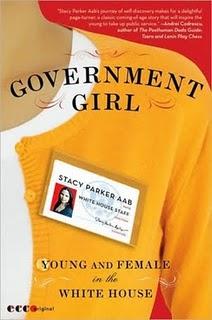Government Girl: Young and Female in the White House

In the 1940s, thousands of adventurous young women flocked to Washington, DC to take wartime jobs in federal agencies. The media dubbed them “government girls.” More than fifty years later, when Stacy Aab née Parker entered the White House as an 18-year-old student intern, she was similarly primed—eager both to serve the nation and to improve her social standing by elbowing in on the country’s movers and shakers.
As a devoted champion of then-President Bill Clinton, this biracial, working class, daughter of the Detroit suburbs was smitten by her proximity to power, and her prattle-filled, if shockingly apolitical, memoir of those years is a fun read. At the same time, it sheds little light on the Clinton years, focusing almost-exclusively on the day-to-day machinations of those within the president’s orbit. Oddly, neither Hillary Rodham Clinton nor first daughter Chelsea are central figures in the text; instead they appear as blips in an otherwise male-centric tale. Indeed, Government Girl is, first and foremost, an insider’s peek at the President’s Men: Paul Begala, Rahm Emanuel, George Stephanopoulis, Vernon Jordan, and numerous Secret Service and FBI agents. Nonetheless, Parker’s writing is extremely descriptive and it is disturbing to glimpse the sexually-charged White House in which women—usually in subordinate positions—were, and perhaps still are, caught in the collision between their own ambitions and the abuse of authority by those who employed them.
Of course, Monica Lewinsky is part of the fray, since Parker and Lewinisky were interns at the same time. While the two were not well acquainted, Parker describes the victim blaming that ensued once Lewinsky’s affair with President Clinton became public: “Monica developed a reputation beyond the office. After the story broke I heard the ‘c’ word used—the kiss of death for an aspiring staffer. She was a clutch, they said. To be a clutch was to be so blinded by desire to be near the principal that you didn’t care who saw you and you didn’t let gossip slow you down…Monica managed to be wherever the president was, whenever she could. She always vied for attention, for time. Clutch.”
Parker further describes the protocol that interns and staff were expected to follow, complete with the wearing of panty hose and suits on even the hottest days of DC summer. Challenging rules was anathema to interns and staff alike. The overriding ethos? Be grateful that you are in the inner circle, no matter if the expectations are absurd, and no matter if there is rampant workplace harassment.
And Parker was thankful. In fact, she makes race, class, gender, and sexual preference seem beside the point when she moves from intern to low-level staffer. As she makes the transition, she offers cringe-worthy revelations. For example, her wide-eyed crushes on the many men with whom she toiled reveal her to be little more than a lovesick teenager. What’s more, as she expounds on her incessant crushes I found her racial politics simultaneously repugnant and shocking. To wit: “Black boys scared me,” she writes. “They got into my space... Maybe because my father was black and no one was going to hurt me as he did, leaving me for good at such a young age.“
In addition, Parker Aab’s political naivete, demonstrated by her blind acceptance of Clinton-era shifts that have decimated communities of color—from the North American Free Trade Agreement to the abolition of Aid to Families with Dependent Children—make Government Girl little more than a guilty pleasure, a juicy morsel that, in the end, is utterly disappointing.
It's not that I didn't like it. i enjoyed reading it but felt that it could have been a deeper look at the Clinton White House. Best to you and Stacy...
Sorry you didn't like the book! I agree, though, that, "it is disturbing to glimpse the sexually-charged White House in which women—usually in subordinate positions—were, and perhaps still are, caught in the collision between their own ambitions and the abuse of authority by those who employed them."
It's frustrating to think that we've come so far, yet we still have so far to go.
Thanks for being on this tour! I appreciate your insights into this book.